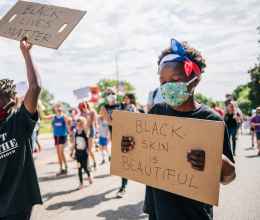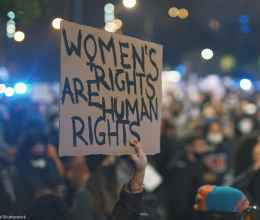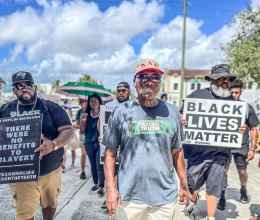
House Bill 7, the education censorship bill initially proposed, and now signed, by Gov. Ron DeSantis, will whitewash important Florida history in classrooms and workplaces all across the state. Florida is one of 17 states nationwide that introduced similar classroom censorship bills during the legislative session. These bills vary slightly by state, but what they all have in common is the vague and overbroad language that chills teachers and students from talking and learning about issues of race and gender and critical pieces of American history.
Alarmingly, the Florida bill affects the accuracy of how important historical events in Florida’s history are taught in schools, some of which even the governor himself recently acknowledged through executive action after they remained comfortably ignored because of their unsettling nature. These include:
The Ocoee Election Day Massacre
Florida's citrus groves gave Black residents in cities like Ocoee the chance to start businesses and pursue economic dreams. During the 1900s, agriculture helped Black Floridians pursue lives of prosperity and hope for themselves and their children.
But as the University of Central Florida’s Pegasus Magazine explains, despite their economic contributions to the area, the real test of Ocoee’s integration came when Black residents attempted to exercise their right to vote on November 2, 1920.
The horrors began when a Black man named Mose Norman was turned away from an Ocoee polling precinct. Norman drove to Orlando to tell John Cheney, a white lawyer who encouraged Black residents to vote, that he was denied his right. Cheney encouraged Norman to record the names of those who were trying to stop him from voting. When Norman returned to Ocoee, however, he was met with violence.
A mob of 200 white men, many associated with the Ku Klux Klan, hunted Norman throughout the night. During their bloodthirst, they targeted Julius “July” Perry, a prominent Black businessman who helped register Black residents to vote. They beat him, shot him, and lynched him.
The white mob murdered between 30 to 60 Black residents in what is now called the Ocoee Election Day Massacre. Within one year of the massacre, all Black residents were driven out of Ocoee. The town did not see a single Black resident again for decades. Not a single perpetrator of this violence was held accountable.
Racial violence, lynchings, and the denial of civil liberties continued for decades after that day in other parts of the state.
The Groveland Four
In 1949, just one generation later, a white woman in Groveland falsely accused Charles Greenlee, Walter Irvin, Samuel Shepherd, and Ernest Thomas—the “Groveland Four”—of raping her. White police officers beat Greenlee, Irvin, and Shepherd into confessing. Greenlee was sentenced to life in prison, the others to death. Lake County Sheriff Willis McCall shot Irvin and Shepherd while they were being transported for a retrial, claiming they were trying to escape. Shepherd died as a result, but Irvin survived by playing dead. Though Irvin denied the sheriff’s false allegation, the sheriff wasn’t charged with any crime.
Mr. Thomas escaped arrest, but a white mob of 1,000 men hunted him down and shot him over 400 times. White residents also committed violence against other people in Black neighborhoods.
These stories have several things in common.
Members of July Perry’s family are still alive. Charles Greenlee’s daughter is still alive. Norma Padgett, the woman who falsely accused the Groveland Four, is still alive. It would be a disservice to the victims of these horrors to pretend that racial violence, and those who perpetrated it, left no impact on today’s communities.
Second, both stories were excluded from Florida’s educational curriculum, and have only recently begun to receive the state-wide attention they deserve, after Black legislators and allies filed legislative resolutions calling for a pardon and urging the Governor to expeditiously take action.
In 2019, the governor issued full pardons to every member of the Groveland Four, two years after the state legislature approved a formal acknowledgement and apology to the victims and their families. In 2020, the governor signed a proclamation declaring November 2 as Ocoee Election Day Massacre Remembrance Day.
The most glaring similarity is that these important stories make people uncomfortable because these are instances of cruel, racialized violence. And that history, the teaching of which is currently challenged by this bill, cannot and should not be denied or erased in the education of our children. They are as uncomfortable as learning about the 1923 Rosewood Massacre, where white mob violence against Black residents erased an entire Florida town from existence. They are as uncomfortable as Jacksonville’s Ax Handle Saturday, an event in 1960 when white residents organized by the Ku Klux Klan beat sit-in protesters and random Black residents with ax handles. They are as uncomfortable as learning about the 2015 murder plot that several white prison guards, who were also members of the Ku Klux Klan, attempted to carry out against a Black man in North Florida.
But Floridians like July Perry and Charles Greenlee deserve to have their stories told honestly. Not only that, but children in Florida deserve and have a First Amendment right to access an accurate and robust education of our history.
HB 7 will almost certainly ensure that it will not be told accurately. It is impossible to tell an accurate version of this history without people feeling uncomfortable. Feeling discomfort or shame about America’s history of slavery and racial violence and Florida’s role in that history is a normal human response.
Rather than try to hide the truth of our state’s history, DeSantis and all in the state should oppose education censorship bills like HB 7.
Our country needs to acknowledge and reckon with its history of systemic racism, discrimination, and people’s lived experiences — this includes being able to teach and talk about these concepts in our schools. Americans in other states should also voice their opposition to government censorship bills like HB 7 and protect students’ fundamental right to learn information that is true and accurate. The First Amendment protects the right to share ideas, including the right of listeners to receive information and knowledge.
Erasing history is dangerous for our democracy and a disservice to future generations.
Kirk Bailey is the political director at the ACLU of Florida. Zuri Davis is a communications strategist for criminal justice reform at the ACLU of Florida.






